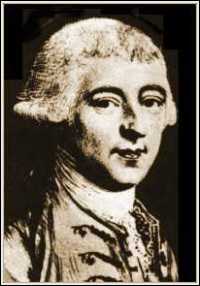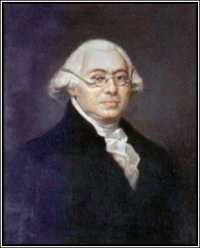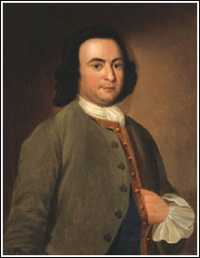FRtR > Documents > The Anti-Federalist Papers > 28
The Anti-Federalist Papers
The Constitutional Convention Debates
Election and Power of the President (September 4, 5, 6)
*** Index
* Quote
* Context ***
- Mr. GOUVERNEUR MORRIS
-
said he would give the reasons of the Committee and his own.
- The First was the danger of intrigue and faction if the appointment should be made by the Legislature.
- The inconveniency of an ineligibility required by that mode in order to lessen its evils.
- The difficulty of establishing a Court of Impeachments, other than the Senate which would not be so proper
for the trial nor the other branch for the impeachment of the President, if appointed by the Legislature,
- No body had appeared to be satisfied with an appointment by the Legislature.
- Many were anxious even for an immediate choice by the people.
- The indispensible necessity of making the Executive independent of the Legislature. ---As the Electors would vote at the same time throughout the U. S. and at so great a
distance from each other, the great evil of cabal was avoided. It would be impossible also to corrupt them.
A conclusive reason for making the Senate instead of the Supreme Court the Judge of impeachments, was that the
latter was to try the President after the trial of the impeachment.
- COLONEL MASON
-
confessed that the plan of the Committee had removed some capital objections, particularly the danger of cabal
and corruption. It was liable however to this strong objection, that nineteen times in twenty the President would
be chosen by the Senate, an improper body for the purpose.
 Mr. BUTLER
Mr. BUTLER-
thought the mode not free from objections, but much more so than an election by the Legislature, where as in
elective monarchies, cabal faction and violence would be sure to prevail.
- Mr. PINCKNEY
-
stated as objections to the mode
- that it threw the whole appointment in fact into the hands of the Senate.
- The Electors will be strangers to the several candidates and of course unable to decide on their comparative
merits.
- It makes the Executive reeligible which will endanger the public liberty.
- It makes the same body of men which will in fact elect the President his Judges in case of an impeachment.
- Mr. WILLIAMSON
-
had great doubts whether the advantage of reeligibility would balance the objection to such a dependence of the
President on the Senate for his reappointment. He thought at least the Senate ought to be restrained to the two
highest on the list
- Mr. GOUVERNEUR MORRIS
-
said the principal advantage aimed at was that of taking away the opportunity for cabal. The President may be
made if thought necessary ineligible on this as well as on any other mode of election. Other inconveniences may be
no less redressed on this plan than any other.
- Mr. BALDWIN
-
thought the plan not so objectionable when well considered, as at first view. The increasing intercourse among
the people of the States, would render important characters less and less unknown; and the Senate would
consequently be less and less likely to have the eventual appointment thrown into their hands.
 Mr. WILSON.
Mr. WILSON.-
This subject has greatly divided the House, and will also divide people out of doors. It is in truth the most
difficult of all on which we have had to decide. He had never made up an opinion on it entirely to his own
satisfaction. He thought the plan on the whole a valuable improvement on the former. It gets rid of one great evil,
that of cabal and corruption; and Continental Characters will multiply as we more and more coalesce, so as to enable
the electors in every part of the Union to know and judge of them. It clears the way also for a discussion of
the question of reeligibility on its own merits, which the former mode of election seems to forbid. He thought
it might be better however to refer the eventual appointment to the Legislature than to the Senate, and to confine
it to a smaller number than five of the Candidates. The eventual election by the Legislature would not open cabal
anew, as it would be restrained to certain designated objects of choice, and as these must have had the previous
sanction of a number of the States: and if the election be made as it ought as soon as the votes of the electors
are opened and it is known that no one has a majority of the whole, there can be little danger of corruption.
Another reason for preferring the Legislature to the Senate in this business, was that the House of Representatives
will be so often changed as to be free from the influence and faction to which the permanence of the Senate may
subject that branch.
- Mr. RANDOLPH
-
preferred the former mode of constituting the Executive, but if the change was to be made, he wished to know why
the eventual election was referred to the Senate and not to the Legislature? He saw no necessity for this and many
objections to it. He was apprehensive also that the advantage of the eventual appointment would fall into the hands
of the States near the Seat of Government.
- Mr. GOUVERNEUR MORRIS
-
said the Senate was preferred because fewer could then, say to the President, you owe your appointment to us. He
thought the President would not depend so much on the Senate for his re-appointment as on his general good
conduct...
The Report made yesterday as to the appointment of the Executive being taken up. Mr. PINCKNEY renewed his opposition
to the mode, arguing
- that the electors will not have sufficient knowledge of the fittest men, and will be swayed by an attachment
to the eminent men of their respective States.
- Hence secondly the dispersion of the votes would leave the appointment with the Senate, and as the President's
reappointment will thus depend on the Senate he will be the mere creature of that body.
- He will combine with the Senate against the House of Representatives.
- This change in the mode of election was meant to get rid of the ineligibility of the President a second time,
whereby he will become fixed for life under the auspices of the Senate...
 COLONEL MASON
COLONEL MASON-
admitted that there were objections to an appointment by the Legislature as originally planned. He had not yet
made up his mind, but would state his objections to the mode proposed by the Committee.
- It puts the appointment in fact into the hands of the Senate, as it will rarely happen that a majority of the
whole votes will fall on any one candidate: and as the Existing President will always be one of the five highest,
his reappointment will of course depend on the Senate.
- Considering the powers of the President and those of the Senate, if a coalition should be established between these two branches, they will be able to subvert the
Constitution---
The great objection with him would be removed by depriving the Senate of the eventual election.
He accordingly moved to strike out the words "if such number be a majority of that of the electors."
- Mr. WILLIAMSON
-
seconded the motion. He could not agree to the clause without some such modification. He preferred making the
highest though not having a majority of the votes, President, to a reference of the matter to the Senate.
Referring the appointment to the Senate lays a certain foundation for corruption and aristocracy.
- Mr. GOUVERNEUR MORRIS
-
thought the point of less consequence than it was supposed on both sides. It is probable that a majority of votes
will fall on the same man. As each elector is to give two votes, more than one quarter will give a majority.
Besides as one vote is to be given to a man out of the State, and as this vote will not be thrown away, one half
the votes will fall on characters eminent and generally known. Again if the President shall have given satisfaction,
the votes will turn on him of course, and a majority of them will reappoint him, without resort to the Senate:
If he should be disliked, all disliking him, would take care to unite their votes so as to ensure his being
supplanted...
- Mr. WILSON
-
said that he had weighed carefully the report of the Committee for remodelling the constitution of the Executive;
and on combining it with other parts of the plan, he was obliged to consider the whole as having a dangerous
tendency to aristocracy; as throwing a dangerous power into the hands of the Senate. They will have in fact,
the appointment of the President, and through his dependence on them, the virtual appointment to offices; among
others the offices of the Judiciary Department. They are to make Treaties; and they are to try all impeachments.
In allowing them thus to make the Executive and Judiciary appointments, to be the Court of impeachments, and to
make Treaties which are to be laws of the land, the Legislative, Executive and Judiciary powers are all blended in
one branch of the Government. The power of making Treaties involves the case of subsidies, and here as an additional
evil, foreign influence is to be dreaded. According to the plan as it now stands, the President will not be the man
of the people as he ought to be, but the Minion of the Senate. He cannot even appoint a tide-waiter without the
Senate. He had always thought the Senate too numerous a body for making appointments to office. The Senate,
will moreover in all probability be in constant Session. They will have high salaries. And with all those powers,
and the President in their interest, they will depress the other branch of the Legislature, and aggrandize
themselves in proportion. Add to all this, that the Senate sitting in conclave, can by holding up to their respective
States various and improbable candidates, contrive so to scatter their votes, as to bring the appointment of the
President ultimately before themselves. Upon the whole, he thought the new mode of appointing the President, with
some amendments, a valuable improvement; but he could never agree to purchase it at the price of the ensuing parts
of the Report, nor befriend a system of which they make a part.
 Mr. GOUVERNEUR MORRIS
Mr. GOUVERNEUR MORRIS-
expressed his wonder at the observations of Mr. Wilson so far as they preferred the plan in the printed Report to
the new modification of it before the House, and entered into a comparative view of the two, with an eye to the
nature of Mr. Wilsons objections to the last. By the first the Senate he observed had a voice in appointing the
President out of all the Citizens of the United States; by this they were limited to five candidates previously
nominated to them, with a probability of being barred altogether by the successful ballot of the Electors.
Here surely was no increase of power. They are now to appoint Judges nominated to them by the President. Before
they had the appointment without any agency whatever of the President. Here again surely no additional power. If
they are to make Treaties as the plan now stands, the power was the same in the printed plan. If they are to try
impeachments, the Judges must have been triable by them before. Wherein then lay the dangerous tendency of the
innovations to establish an aristocracy in the Senate? As to the appointment of officers, the weight of sentiment
in the House, was opposed to the exercise of it by the President alone; though it was not the case with himself.
If the Senate would act as was suspected, in misleading the States into a fallacious disposition of their votes for
a President, they would, if the appointment were withdrawn wholly from them, make such representations in their
several States where they have influence, as would favor the object of their partiality.
- Mr. WILLIAMSON
-
replying to Mr. Morris: observed that the aristocratic complexion proceeds from the change in the mode of appointing
the President which makes him dependent on the Senate.
- Mr. CLYMER
-
said that the aristocratic part to which he could never accede was that in the printed plan, which gave the
Senate the power of appointing to offices.
- Mr. HAMILTON
-
said that he had been restrained from entering into the discussions by his dislike of the Scheme of Government
in General; but as he meant to support the plan to be recommended, as better than nothing, he wished in this
place to offer a few remarks. He liked the new modification, on the whole, better than that in the printed Report.
In this the President was a Monster elected for seven years, and ineligible afterwards; having great powers,
in appointments to office, and continually tempted by this constitutional disqualification to abuse them in
order to subvert the Government. Although he should be made re-eligible, still if appointed by the Legislature,
he would be tempted to make use of corrupt influence to be continued in office. It seemed peculiarly desireable
therefore that some other mode of election should be devised. Considering the different views of different States,
and the different districts Northern Middle and Southern, he concurred with those who thought that the votes
would not be concentered, and that the appointment would consequently in the present mode devolve on the Senate.
The nomination to offices will give great weight to the President. Here then is a mutual connection and influence,
that will perpetuate the President, and aggrandize both him and the Senate. What is to be the remedy? He saw
none better than to let the highest number of ballots, whether a majority or not, appoint the President. What was
the objection to this? Merely that too small a number might appoint. But as the plan stands, the Senate may take
the candidate having the smallest number of votes, and make him President.
 Mr. BUTLER
Mr. BUTLER Mr. WILSON.
Mr. WILSON. COLONEL MASON
COLONEL MASON Mr. GOUVERNEUR MORRIS
Mr. GOUVERNEUR MORRIS